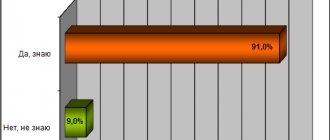Rights of residents in state apartments
The procedure for operating a residential municipal facility is regulated by Art. 60, 65 and 67 Housing Code of the Russian Federation . In a social rental agreement, the owner of the housing is the municipality, that is, the lessor, and the tenant is the person who lives in this apartment.
The tenant is not considered the full owner of municipal housing; he can only live in it. Tenants do not have the right to sell, donate or bequeath such housing, since the real estate is assigned to the state.
Through the court
To evict a tenant (regardless of who the owner of the property is), you must file a claim in court.
If there has been a violation of the rights of other citizens, then the first thing you need to do is call the local police officer, who will be able to record the violation, which will become the basis for appealing to the courts.
The claim will be filed at the place of residence of the tenant, and the owner of the apartment will act as the plaintiff.
A copy of the statement of claim will be sent to the defendant (employer). The case will be considered by the city or district court department.
All accusations against the employer must be proven, otherwise they will not be taken into account.
If there was an attempt to resolve the issue pre-trial, then information about this will also be presented in court.
If the court confirms the legality of the eviction demands, the bailiffs will receive a writ of execution with the appropriate decision, after which they will begin to initiate enforcement proceedings (that is, they will evict the offender from the apartment).
The owner cannot evict a person from an apartment who has lived in it for less than a month.
Rented housing
Tenants' responsibilities
These include:
| Prompt payment of housing and communal services | transfer of payment for the apartment |
| Carrying out routine repairs in the apartment | The tenant, as well as members of his family, undertake, as necessary, to carry out routine repairs of the provided residential premises. Whereas major repairs are carried out at the expense of the property owner |
| Maintaining the appropriate condition of the apartment | In other words, when using the premises, the tenant, as well as members of his family, undertake to maintain the engineering, technical and sanitary condition |
| Ensuring safety | provided premises |
| Use of the provided residential premises exclusively | provided for by the Housing Code of the Russian Federation and other regulatory documents. In other words, the tenant and his family members undertake to use the apartment exclusively as living space. |
| Subject to changes in the tenant's circumstances | as well as the grounds that give him the legal right to use such living space, he is obliged to notify the opposite party of this fact within the time limits established in the agreement. |
What to do if the employer does not pay utility bills
In accordance with the provisions of Article No. 67 of the Housing Code of the Russian Federation, the tenant undertakes to pay rent and pay for utilities.
If he refuses to do this, the lessor, in other words the state, has the right to terminate the contract ahead of schedule.
There are basic approaches with which you can deal with debtors for housing and communal services. And yet they can be used both for apartment owners and tenants under a social tenancy agreement.
Impact options:
| Expulsion from the apartment | if the debt for housing and communal services exceeds half a year, the owner of the property is obliged to initiate legal action by demanding that the debtor be expelled from the occupied premises |
| Shutdown | from networks |
| Supply limitation | a similar method of influence is used, provided that the utility user has not paid for services in whole or in part within 30 days |
| Crediting penalties | in the amount of 1/300 of the refinancing rate on the date of arrears for the entire amount of the debt |
However, if the tenant uses the apartment on the basis of a rental agreement, the parties can discuss among themselves who will pay for housing and communal services and how.
Basically, the owner is responsible for this, since all utility receipts are issued in his name. The owner of the apartment has the right to include this amount in the rent.
The tenant must pay only for those services that are offered through personal metering devices (heating, electricity, water).
Provided that if the tenant does not pay for utilities, then the landlord has the right to unilaterally terminate the agreement with him.
This means that it is best to conclude a lease agreement for a period of no more than one year. This will give the owner more opportunities to get rid of the debtor.
It is much more difficult to resolve the problem if the tenant does not pay rent without an agreement. In this case, the state will not be able to help; the issue must be resolved exclusively between the parties.
For housing
Provided that the tenant does not pay the rent within the established time frame, the owner of the living space has the right to unilaterally terminate the agreement by expelling the tenants.
If we are talking about a social rent agreement, in this case the rent is included in the list of utilities provided by the state, which any tenant undertakes to pay on time.
If the tenant fails to pay utility bills, the apartment owner has the right to file an application with the court, demanding the expulsion of the tenants.
If the debt exceeds half a year
This is the most common ground for expulsion of tenants.
A similar measure can be applied to tenants under a social tenancy agreement. This fact is legally enshrined in Article No. 90 of the Housing Code of the Russian Federation.
Late payment by more than 6 months is grounds for expulsion. The size of the debt is not significant. Expulsion from the occupied premises is permissible solely on the basis of a court decision.
If the owner of the property decides to apply such measures of influence against the tenants, he must submit an application to the judicial authority at the location of the apartment.
Applications for expulsion are considered by district or city courts.
How to change the responsible tenant through the MFC, read here.
Rights and responsibilities of residents in a social rental apartment
The disposal of an apartment that was transferred under a social tenancy agreement is limited, since a citizen who has received the right to reside and use housing cannot fully exercise the powers provided for the owner. Accordingly, you cannot sell, donate, bequeath or make other transactions with a non-privatized apartment.
When the tenant dies, the apartment he used on the basis of social rent does not change its non-privatized status and remains the property of the municipality. According to Art. 82 of the Housing Code of the Russian Federation, a family member of a deceased person can re-register a rental agreement in his own name, maintaining the previous terms of the agreement.
Only those persons who lived with the deceased person, even if they are not relatives, can apply to re-register the contract on the same terms. If there were no such people, then the municipality has the right to transfer the right to use housing to other persons not related to the previous tenant.
Documentation
Attention!
- Due to frequent changes in legislation, information sometimes becomes outdated faster than we can update it on the website.
- All cases are very individual and depend on many factors. Basic information does not guarantee a solution to your specific problems.
That's why FREE expert consultants work for you around the clock!
- via the form (below), or via online chat
- Call the hotline:
APPLICATIONS AND CALLS ARE ACCEPTED 24/7 and 7 days a week.
When does an ex-husband have a chance to temporarily retain the right to live in his wife’s apartment?
When considering in court a wife’s claim to annul the ex-husband’s right to use an apartment belonging to her, the court considers all the nuances. If the former relative does not have another home and does not have enough funds to purchase it or rent another apartment, then the judge has the right to suspend the cancellation of the spouse’s right to use the ex-wife’s apartment for a certain period. The law does not stipulate a specific time period for which the right to reside in the wife’s apartment can be retained.
The specific period is determined directly by the judge based on the circumstances presented by each of the former spouses. If the wife, in pursuit of her interests, claims that the ex-husband has the means to arrange a lease for another home, she must document this. For example, you can present an extract from the accounting department of the enterprise where your ex-spouse works about his income. If the husband proves that he uses these funds, for example, to pay a debt or alimony for children from another marriage, then the court will take these circumstances into account.
If the judge decides to suspend the wife’s claim, then she does not need to file the claim again at the end of the period for which the tenant’s right of residence was extended. This is due to the fact that the court decision to extend the period of residence includes a condition that after this period the possibility of a new extension of the right of residence is not provided for by law, and the wife’s initial claim is considered finally satisfied by the court decision. The court notifies the Federal Migration Service of this fact and obliges it to remove the ex-spouse from the register.
Inheritance of a given premises
Since a municipal apartment already has an owner - the state, members of the tenant's family cannot inherit it.
Everyone who has a residence permit in a municipal apartment has the right to use it, even if the responsible tenant has died. You just need to re-register the social lease agreement for another family member.
In order to dispose of housing, it must be privatized, that is, registered free of charge as property.
Everyone who has a permanent residence permit has the right to do this.
List of documents
To register ownership of a municipal apartment you will need:
| Personal documents of all applicants |
|
How to register in a municipal apartment with your husband - procedure
In addition to private property, residential premises can also have the status of both state and municipal. In apartments belonging to the last two types of housing stock, it is more difficult to register and, in order to register in a municipal apartment with a husband, future residents are presented with other requirements.
Is it possible to register a wife in a municipal apartment?
As a general rule, a citizen can register his spouse in a non-privatized apartment belonging to the municipal housing stock.
If he lives in it alone and no one’s consent is required, he must appear with his wife at the passport office and present a marriage certificate. All documents must have both signatures of the participants in the registration process.
It is more difficult to obtain registration for a spouse when a man lives with relatives who are registered with him in the same apartment.
Housing legislation requires the mandatory written consent of all neighbors, since the addition of another tenant is regarded as “deterioration of living conditions” (Article 53 of the Housing Code of the Russian Federation).
But the obligation to obtain consent depends on who is the employer under the social tenancy agreement. If this is a spouse, then he does not need the consent of the other residents.
If, for example, the husband is the son of the employer, the consent of that parent is necessary.
After receiving consent from all neighbors, the initiator must notify the municipality about the registration and move-in of a new tenant.
If no one living in the neighborhood has given their consent, the citizen can file a claim in court for forced entry into the apartment. Drawing up such a claim is not an easy task; you need to competently and convincingly present the essence of the issue so that the judge takes the side of the spouses and obliges the municipality or neighbors not to interfere with registration.
It is recommended to contact a lawyer who has successfully resolved housing disputes.
How to register in a municipal apartment with your husband
The algorithm for registering a spouse in an apartment depends on the method of submitting documents.
Where to contact
In order to register a person in a residential area, you can:
- personally contact the passport office of the management company;
- come to the police department or one of the Multifunctional Centers;
- use the Internet portal “State Services”.
To quickly complete registration, it is better to contact the Department of Internal Affairs.
Package of necessary documents
In the event that there are no objections from the neighbors in the apartment, in order to register a spouse in a municipal living space, the following documents must be presented:
- application for registration accompanied by the written consent of all residents (if the husband is not the tenant of the apartment under the contract);
- personal presence of all registration participants or notarized confirmation of the consent of the absent citizen;
- marriage certificate;
- departure sheet;
- extract from the house register;
- military ID;
- financial and personal account in a copy.
When all documents have been submitted, the passport office employee fills out special forms and sends them to the Federal Migration Service.
If there are no complaints from the specialist, within a week from the moment of submission, the new tenant will be registered, and information about the official place of residence will appear in the passport.
Or a certificate of temporary registration is issued if the application indicated a specific period for registration.
Most often, the reason for refusal of registration is a decrease in the living space standard or the lack of consent of the tenant.
It is recommended to immediately contact the judicial authority, since failure to register may result in administrative liability and the imposition of a fine on the wife (Article 19.15 of the Code of Administrative Offenses of the Russian Federation)
Registration procedure through court
Every citizen of our country is guaranteed the right to go to court to protect their interests. To do this, you need to draw up and submit an application to the municipal authority for registration of a specific person (in this case, the spouse) in the residential premises.
When applying to a judicial authority, you have to perform a number of actions:
- Collect written consent from residents and the owner (if required).
- Draw up a statement of claim, even if there is only one refusal from the tenant.
- Collect a package of documents and evidence of the legality of actions.
- Participate in court hearings and defend your legal position.
- Wait for the court's decision.
How to file a claim correctly
The statement of claim must contain the following mandatory points:
- name of the judicial authority;
- information about the plaintiff and defendant (full name, residential address and contact details);
- a detailed statement of the grounds for applying for judicial protection (descriptive part);
- requirement to register, citing a violation of specific provisions of the law (petition part);
- appendix – list of documents for the application;
- date and signature of the applicant or his representative by proxy.
The appendix to the claim includes:
- social rental agreement;
- Marriage certificate;
- birth document of children (if any);
- consent or refusal of the residents (owner);
- check for payment of state duty;
- other documents substantiating that the owner committed illegal actions against the applicant.
The number of duplicates of the statement of claim is equal to the number of participants in the case. All documents are submitted in copies; the originals will be required during the trial for review and comparison with the case.
From the moment the claim is filed until the decision is made, as a rule, one month passes. If an appeal is filed against the decision, this period is increased by at least three weeks, or even a month. A positive court decision is transferred to the passport office, where the new resident is registered.
on the topic
Source: https://prozakon.guru/semejnoe-pravo/zashhita-prav/kak-propisatsya-v-munitsipalnuyu-kvartiru-k-muzhu.html
Operation of social housing premises
The regulation of the use of municipal housing is carried out by articles 60, 65 and 67 of the Housing Code of the Russian Federation. In order for the exploitation of residential premises to be recognized as legal, a social tenancy agreement is concluded, according to which the citizen is always the tenant, and the owner (municipality) is the landlord.
Attention! The agreement cannot contradict the provisions of housing legislation; accordingly, the citizen is provided with the following list of rights:
- to move in persons who are not relatives of the tenant;
- re-let the residential premises either completely or partially;
- provide the opportunity for temporary residence to other persons;
- exchange or replace one home with another;
- make demands for the provision of utility services, major or routine repairs, and so on.
At the same time, the tenant is obliged to maintain the condition of the housing, use it only for its intended purpose, and also ensure the progress of repair work and payment for housing and communal services.
If there are circumstances that allow a person to fulfill obligations or exercise rights under a rental agreement, then the owner of the premises must be informed about them. If a citizen violates the terms established by the contract, the municipality has the right to terminate the relationship with the tenant and stop using the housing.
If these conditions are met, there is a chance for the ex-husband to be discharged
It will be possible to write out an ex-husband without his consent only if ALL the conditions that are listed in paragraph 32 of the Resolution of the Plenum of the Supreme Court of the Russian Federation dated July 2, 2009 No. 14 are met. And it makes no difference whether the ex-husband is included in the warrant or social tenancy agreement, or he is simply registered as a family member in a municipal apartment. The conditions are listed in the form of a chain and they are considered by the judge in their entirety, i.e. all of them must be fulfilled:
- The ex-husband does not live in the apartment for a long time - clause 3 of Art. 83 Housing Code of the Russian Federation. The exact minimum term has not been established by law or judicial practice. The more the better. My opinion is at least 3 years . If he does not live for 1 year, then the chance of his being discharged is maximum 20%. If 2 years - 50%. If 3 years - 90%. No conscientious lawyer/attorney can guarantee 100% success, so I am as I am. According to paragraph 4 of Art. 69 of the Housing Code of the Russian Federation, if the ex-husband continues to live in a municipal apartment after a divorce, he retains the right to use like everyone else.↓
- He left the apartment on a permanent basis, and not temporarily due to study, work, business trips, treatment, etc. - Art. 71 Housing Code of the Russian Federation. That is, I took all my things out of the apartment. It’s even better if he lives with a new family or in another locality.↓
- He left voluntarily (Clause 2 of Article 1 of the RF Housing Code), and not forced due to conflicts with his former family or is in prison. A citizen who is in prison cannot be discharged from a municipal apartment. The court will refuse. More precisely, you can submit the court verdict to the passport office and it will be “formally” issued. After leaving prison, he can register back without any problems. If the apartment is privatized, he can easily challenge the privatization through the court and get a share. Even when the owners of the apartment change.↓
- He does not pay utility bills, does not participate in the repair and maintenance of the apartment - clause 4 of Art. 69 Housing Code of the Russian Federation. Preferably at least 3 years - according to the logic of the minimum period of non-residence. If the ex-husband proves in court that he pays at least part of the utilities, the claim will be rejected.↓
- He did not try to move into the apartment again, and if he did, he was NOT prevented from doing so.
By the above actions, the ex-husband shows the court that he VOLUNTARILY renounced his right of residence, and therefore loses it. Checkout instructions are written below.
There are more chances if you contact a lawyer
If all the above conditions are met, this only changes the matter halfway. The main difficulty is that in court the existence of conditions MUST BE PROVED IN WRITTEN. The judge will not believe the words and arguments. To prove everything, you need to provide the judge with certain certificates and acts from various government departments and organizations. An ordinary citizen will not be able to obtain most documents himself, because he does not have a certain status and authority. More precisely, he can make a request, but they will not answer it, since they are not obliged. So hire a lawyer. He, having legal status, will make inquiries about the necessary organizations - paragraphs. 1 clause 3 art. 6 and paragraph 5 of Art. 6.1 Federal Law of May 31, 2002 No. 63-FZ. Organizations are required to respond to requests from lawyers, otherwise they face a fine - Art. 5.39 Code of Administrative Offenses of the Russian Federation.
Be sure to read it! Minimum period of ownership of an apartment to sell it without tax - what is it and how to calculate it
If you do not contact a lawyer, you can ask the judge to gather evidence. The judge will issue the requests, but will ask you to take them to the organizations. Plus pick up the answers to them. He will ask, but he cannot force you. And you will not have the opportunity to adjust requests that are more beneficial to you. And you will no longer be able to filter out the answers received and discard unnecessary ones. In addition, you will not know some of the answers because they will be sealed in envelopes. All this greatly reduces your chances of winning your case.
A lawyer will study your situation and make inquiries to those organizations that are beneficial to you. The lawyer will draw up requests, send them and collect responses to them. From the received answers, he will select the most useful ones. I have indicated below which organizations you need to contact.
The most important thing is that it is much CHEAPER to hire a lawyer and at the same time have a better chance in court than to later, during privatization, give a share to your ex-husband that he did not deserve. In the future, you can buy out his share, which will be much more expensive. If he still agrees.
About the address of the ex-husband's residence
I’ll answer these questions right away: “I don’t know where my ex-husband lives now. What address should I include in the statement of claim then? And if I know, then indicate his actual residential address?”
The Supreme Court believes that the defendant’s residential address is considered to be his registration address - paragraph 63 of the Resolution of June 23, 2015 N25. Therefore, in the statement of claim, we indicate the address of the ex-husband’s place of residence in the municipal apartment from which he needs to be discharged. After all, he is registered in it. The plaintiff has no obligation to know the actual address.
As a result, all court summonses will be sent to the ex-husband to the address of the municipal apartment - Art. 113 Code of Civil Procedure of the Russian Federation. If he does not receive them (he does not live there), the court will still consider him notified. Every citizen is required to receive important correspondence, so the law is followed here. If the ex-husband does not appear in court, the claim will be considered without him - clause 4 of Art. 167 Code of Civil Procedure of the Russian Federation. This is to the advantage of the plaintiff, because the defendant will not be able to protect his interests.
Who does not have the right to housing
To privatize an apartment, a citizen must have permanent registration at a specific address. If we are talking about relatives, then they must be specified in the contract and live together with the employer. To register other persons and give them the opportunity to privatize housing in the future, you will need to obtain the consent of the municipality.
In the event of the death of the tenant, non-privatized housing remains with close relatives (children, spouses, parents), if they are registered in the apartment. Other citizens cannot apply for living space and formalize privatization. Any of the relatives living with the deceased tenant can act as a recipient of housing, subject to the age of majority and legal capacity.
Going to court
The owner of the apartment has the sole right to sue the tenant.
And yet, there are some circumstances in the presence of which it is impossible to expel for non-payment of housing and communal services:
- Due to the disability of the tenant or a member of his family
- Due to the difficult health condition of the tenant or his family members
- If the family has minor children
- In case of delay by the employer of wages for a period of more than 3 months
- Due to loss of employment as a result of a sharp deterioration in the family financial situation.
Drawing up a lawsuit
The law does not define a special form of the statement of claim; for this reason, this document is drawn up arbitrarily. At the same time, the claim must meet certain requirements set out in Articles No. 131, 132 of the Civil Procedure Code of the Russian Federation.
In the claim, the owner of the living space must set out:
— All information about the judicial authority
— Maximum permissible information about the parties to the application.
The claim must provide information about:
- the full name of the applicant with a mark of the organizational and legal form;
- initials, position of the head of this structure;
- requisites.
Since the defendant is the tenant, in other words an individual. person, this means that the claim states:
- Full name of the defendant.
- Place of residence.
- Data on methods of communication with the defendant.
In addition, participation in legal proceedings by third parties is allowed. This means that this data must be noted in the document. Provided that minor children are registered in the disputed residential premises, this means that representatives of the guardianship and guardianship authorities must also take part in the process.
— Basic information on the claim
In the document, the applicant reports that the tenant of the residential premises in question was overdue for utility bills for a period of over 6 months. The owner undertakes to prove the fact of late payment by providing general information about the living space. Including:
- apartment location address;
- the legal basis on which ownership rights arise. Since the owner is the structure of state power, this means that the foundation is an act of the structure of state power;
- details of the claim;
- number of residents who have permanent residence in this apartment;
- pre-trial measures taken by the applicant for removal
— A request to expel the debtor and his family members from the occupied premises, as well as to remove them from the registration register.
— List of documents that the applicant attaches to the lawsuit
— Date of registration, signature
Additional documentation package
The application must be accompanied by:
— Documents in accordance with which the defendant occupies the specified residential premises may include:
- Act of the state power structure on the provision of an apartment
- Move-in warrant.
- Social rent agreement.
— An extract from the house register about each person registered in this apartment
— An extract from the personal account, which shows that such residential premises have a debt on housing and communal services
— Property document (copy).
For a sample of filling out an extract from a tenant’s personal account, see the article: extract from a tenant’s personal account.
Video: What to do if the tenant does not pay for housing and does not want to move out
(No Ratings Yet)
Municipal apartment after the death of the tenant
According to Art. 69 of the Housing Code of the Russian Federation, if the responsible tenant had relatives and they lived with him (that is, they had registration in municipal housing and were indicated in the social tenancy agreement), then the right to operate this apartment passes to them.
The transfer of the right of use is formalized by concluding a new social tenancy agreement with the owner.
The employer can be any member of the deceased’s family, specified in the previous contract and registered here.
But he must meet the requirements imposed by law on the employer.
Dear readers! The article talks about typical ways to resolve legal issues, but each case is individual. If you want to find out how to solve your particular problem , contact a consultant:
+7 (Saint Petersburg)
APPLICATIONS AND CALLS ARE ACCEPTED 24/7 and 7 days a week.
It's fast and FREE !
That is, it should be:
Fully competentIf the tenant lived alone in a non-privatized apartment or other relatives lived with him without registration, then after the death of the tenant the housing will “return” to the owner, that is, to the municipality.
The relatives of the deceased will not be able to inherit it. It will continue to be provided to citizens recognized as needing municipal housing under a social tenancy agreement.
Option for subsequent privatization
If the apartment is owned, then you can dispose of it at your own discretion.
It can be:
If an apartment is privatized for several owners, then it can only be sold with the consent of everyone.
Do you want to register your spouse without the consent of those living in a municipal apartment? Advice for wife and husband
A person who wants to register in municipal housing, especially if he is registering in an apartment with his legal wife or husband, usually assumes that everything will go quickly and without complications.
But this does not always happen this way. The registration procedure for municipal property is very different from the same process when the property is private. In the second option, everything may turn out to be much simpler.
In the case of a spouse’s registration in a state apartment, the registration authorities impose completely different requirements.
So how can you register in a municipal apartment with your husband or wife? Let's look at everything in detail.
Rules for registration in municipal housing
In order to register a stranger in a municipal apartment, you will first need the consent of all persons living in this living space.
This provision is regulated by Article 70 of the RF Housing Code. Then you should notify in writing the municipal authorities that own the property.
The administration will make a positive decision only if there is no deterioration in living conditions. That is, if, according to the housing standards in force in the region for a given period, there will be enough square meters for each resident, including newly registered residents.
Otherwise, a refusal will be received.
To register a close relative (in addition to the spouse, this includes parents and children), the following aspect is important: is the spouse an employer, that is, the person for whom the social tenancy agreement is drawn up?
If so, the owner’s permission is not required, but the written consent of all residents, including those temporarily absent, is also required.
When someone is away and is not expected to return soon, you can ask for their consent in writing and then have the document certified by a notary. Without anyone's consent, it is only allowed to register a child under 14 years old in an apartment where at least one of the parents is registered.
If the employer is someone else (for example, the husband’s mother), then the wife will have to register on a general basis, with the written consent of the owner, tenant and other registered persons.
And if the municipality considers that with the moving in of a new tenant there will be a deterioration in living conditions (there will be fewer square meters per person), registration may be refused.
Also, if at least one of the adult residents registered in the apartment is against moving in and does not sign consent, the wife’s registration may not take place.
In this case, there is only one way out - going to court. But more on that below; first, let’s consider a successful case when the owner gave permission and the residents do not object. Where and with what documents should I apply?
Where to submit documents
In this case, there are several options.
You can use the following methods:
- passport office of housing department (management company);
- department of the Federal Migration Service at the place of residence;
- MFC branch;
- unified Internet portal “State Services”.
The time frame for registration will depend on which option is chosen.
In any case, it is carried out by the Federal Migration Service, so applying directly to the department of this service will be the fastest - registration will take 3 business days.
In all other cases, the terms will increase, but only slightly. The procedure is free of charge and no registration fees are charged.
What documents will be required
Before submitting documents, you need to make copies of them; they will be required. You will need to collect the following package of papers:
- passports of the employer and the registered person;
- application for registration in the prescribed form;
- written consent of each of those registered;
- social tenancy agreement (or move-in order);
- copy of personal account;
- Marriage certificate;
- departure slip.
The last document is included in the list, as it is often required at passport offices. But this is illegal. According to the law, a person can be automatically discharged at the request of FMS employees. Registration cannot be refused due to the absence of this document.
Another caveat is that the application must be filled out only by the employer personally.
If all other documents are in order, then the registration procedure will be completed within 3-5 days, after which the new resident will receive his passport back with a registration stamp.
As for the registration of temporary registration, it is carried out in the same way, but instead of a stamp in the passport, a certificate of temporary registration is issued, which will indicate specific periods of residence.
Registration through court
If it was not possible to reach an agreement and the registration process has reached a dead end, the judicial authorities can help. You need to go to the district court at the defendant’s place of residence.
The statement of claim must indicate:
- name of the court;
- plaintiff's details;
- justification for the illegality of the refusal;
- request to register.
The justification must be drawn up correctly, with references to the legislation, so the help of an experienced lawyer in this case will be very useful.
As a rule, the court takes about a month to consider such cases, then a decision is made. If it is positive, the passport office will carry out the registration procedure based on the court decision.
Rights and responsibilities of a new tenant
A tenant registered in an apartment will have the same rights as others to use common building and apartment property.
But he is also obliged to share the responsibilities for maintaining the home and paying rent with everyone, since they will naturally increase.
Also, a spouse can become a co-owner of housing by taking part in the privatization procedure.
And it is worth realizing that if family relationships do not work out, this will not affect the right of ownership. This is partly why the process of obtaining consent is often so difficult that the case ends up in court.
Source: https://prodatkvartiry.ru/registraciya/xotite-propisat-supruga-bez-soglasiya-prozhivayushhix-v-municipalnoj-kvartire-sovety-zhene-i-muzhu/.html
Who must pay rent on time: the owner or the registered owner
Important
The main grounds and conditions for eviction from a municipal apartment for housing and communal services debt:
- payments for all categories of housing and communal services are not made for longer than 6 months;
- there are no valid reasons explaining the debt.
The legislative framework:
- Housing Code of the Russian Federation, Art. 90, 91, 103, 153;
- Civil Procedure Code of the Russian Federation;
- Civil Code of the Russian Federation;
- Constitution of the Russian Federation;
- Resolution “On approval of rules for the use of residential premises.”
If several persons live in municipal housing, all living adult citizens, and not just the tenant, are responsible for non-payment of housing and communal services. The right to evict belongs directly to the employees of the bailiff service, acting on the basis of a legal decision on eviction that has entered into force.
Management company employees do not have the right to force residents to vacate the premises.







